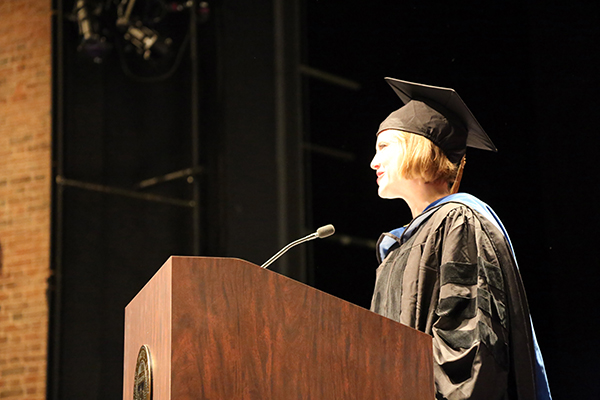
Good morning and congratulations.
Those of us graduating today share a common vision: Knowledge advancing social justice. While in residency, I was lucky to read Paolo Freire’s “Pedagogy of the Oppressed” with Professor Larry Simon. Central to Freire’s pedagogy is this: Every human being is capable of engaging with the world through what Freire called “praxis.” Praxis is a process of “reflection and action upon the world in order to transform it.” There’s no better definition for what we are trained to do here: reflect, act, transform.
This is my third and final degree from Brandeis, and my second from the Heller School. When I arrived at Brandeis as an undergrad in 1999, I was an earnest young woman, passionate about social justice, and committed to using my drive and intellect to contribute to a more equitable world. Three degrees, two children, and one dissertation later, I leave Brandeis an earnest young-ish woman, still passionate about social justice. My commitment to a more equitable world has never wavered. On the contrary, it has been bolstered – again and again – by fellow students and mentors whose passion matches mine.
In undergrad, in the MPP program, and in my doctoral studies, the most valuable aspect of my Brandeis experience was that I was encouraged to ask questions.
So ask I did.
During my coursework: Why do we have social welfare systems that promote marginalization and dehumanization rather than equity and wellbeing? Why do we prioritize rationing and means-testing over building social capital and fostering self-determination? How can we translate rigorous research to sound policy to measurable social change?
Through this process, I refined my interests, chose an area of focus, and began to build a body of work. My research examines innovations in behavioral health services, specifically peer-delivered services and self-direction. Peer-delivered services are provided by people with their own personal lived experience of mental health challenges or addictions. They promote hope that recovery is possible and bring the unique perspective of having “been there.” In self-direction people control funds typically spent on their mental health treatment to purchase traditional and non-traditional goods and services to meet their unique needs.
When it came time for my dissertation, I asked these questions: What happens when we hand over control of resources to people historically considered unable to make decisions for themselves? What happens if we shift the balance of power from those providing a service to those using it? What happens when people who are on the receiving end of mental health treatment are meaningfully engaged as partners in planning, providing, and evaluating their services?
I’m not sure I’ve fully answered any of these questions, but I’ve certainly refined them over time, and through my research and continuing body of work, I’m contributing to the conversation and – I hope – providing change makers with actionable information to move the needle. Reflect, act, transform. Each of you – graduates, faculty, colleagues – are doing the same.
But this process should not – cannot – be reserved solely for graduates of schools of social policy. Freire says that to reflect, act, transform is to be fully human. This process is not only how we improve our social service systems, it is the goal of our social service systems.
In closing, I offer some new questions for the coming years: How can we promote reflection and action at all levels, for all people? How can we, through praxis, partner with diverse stakeholder groups to transform dehumanizing and marginalizing practices into those that promote inclusion and citizenship? We need reflection and action now more than ever, and I am honored to stand with Heller graduates past and present to further its mission of knowledge advancing social justice.
